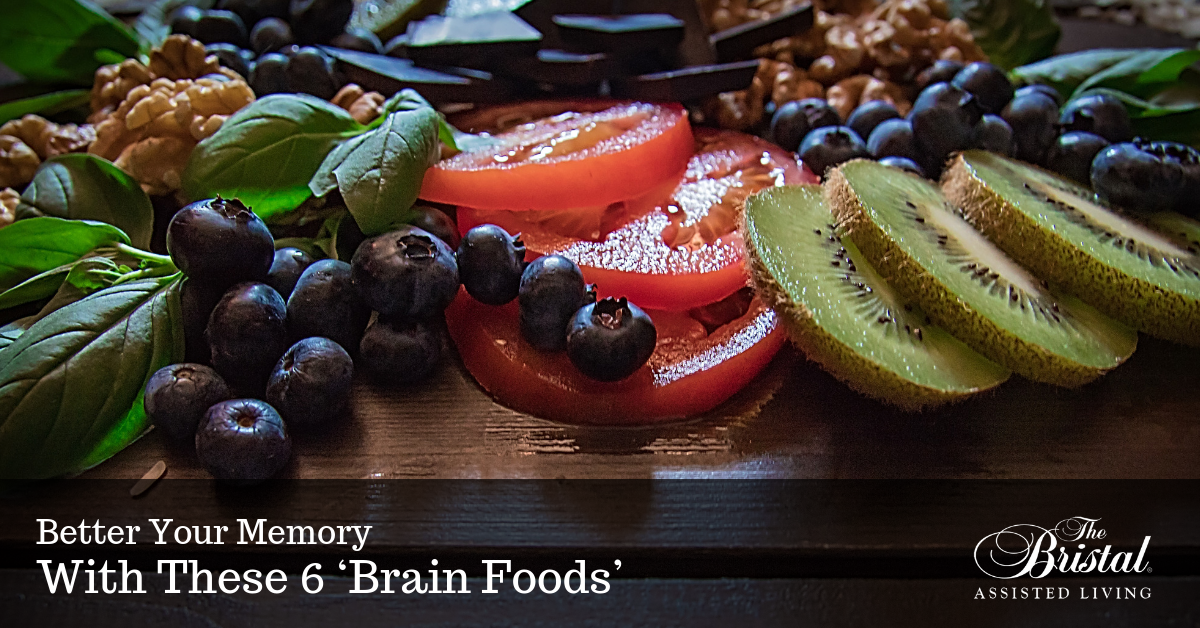While there is no magic food to improve your brainpower (yet!), there are a few foods that research has shown may be able to delay dementia, such as Alzheimer’s disease. While it’s very important to eat a balanced diet (more on that below), it’s always best to check with your primary physician before you make any lifestyle changes.
Which Foods are Good for Memory?
Research has linked these six brain foods to delaying memory loss. Read on to see how you may be able to eat your way to better health.
1. Berries
Berries are rich in flavonoids, which can improve cognitive function, according to this study. Researchers found women who ate two or more servings of berries a day had a slower rate of memory decline- up to 2.5 years.
The U.S. Department of Agriculture recommends women older than 50 consume 1.5 cups of fruit daily, and men over 50 eat 2 cups of fruit every day.
Strawberries and memory: What’s the connection?
2. Caffeinated beverages
Go ahead and enjoy that morning cup o’ joe or green tea. Caffeine has been linked to better memory retention, according to this study by researchers at Johns Hopkins University. Just make sure to not have it to close to bedtime so it doesn’t affect your sleep quality.
3. Green, leafy vegetables
The kale craze isn’t going away anytime soon. According to a study published in 2018 in the medical journal “Neurology,” one daily serving of green, leafy vegetables could slow age-related memory loss.
Besides kale, other green, leafy vegetables referenced in the study include spinach, collard greens, and lettuce.
4. Extra-virgin olive oil
Researchers at Temple University have identified a key component to the popular Mediterranean diet’s benefits: Extra-virgin olive oil.
The researchers found olive oil “reduces brain inflammation and activates autophagy,” which is how cells break down toxins like beta-amyloid plaques. These proteins have been linked to Alzheimer’s disease.
This versatile condiment can be used to make your own salad dressings or used in cooking.
5. Fatty fish rich in omega-3s
Fish are a great source of unsaturated fats, like the omega-3 fatty acids DHA and EPA. These fatty acids help improve cognitive function, according to these studies by The University of Illinois, which linked omega-3 fatty acids and omega-6 fatty acids to healthy brain aging.
Wild Alaskan salmon, Atlantic mackerel, and sardines are a few of the omega-3 rich, low-mercury foods on this guide from the Environmental Defense Fund’s Seafood Selector.
6. Nuts
As well as being packed with protein, fiber, and Vitamin E, nuts join a few other items on this list with beneficial ingredients such as unsaturated fats and omega-3 fatty acids. This study by Loma Linda University found regularly eating nuts can strengthen brainwave frequencies.
They are also heart-healthy, according to the Mayo Clinic who recommends replacing foods containing saturated fats with a handful of nuts or a tablespoon or two of a nut butter.
Related Read -- Alzheimer’s & Mealtime: Tips for Success
Brain Foods and the Importance of a Healthy, Balanced Diet
Besides lowering obesity rates, good nutrition is important to reduce your risk of diseases and help your overall health, not just your brain function.
On top of eating a well-balanced, healthy diet consisting of a variety of foods, consider the following suggestions from the Alzheimer’s Association when looking to boost your brain health:
- Limit foods with high saturated fats, such as butter and lard.
- Reduce your intake of refined and processed sugars.
- Cut down on salt to limit your sodium intake.
Other Ways to Help Your Brainpower
In addition to making healthier choices in your diet, you can also try increasing your physical activity, as well as adding mental exercise, socialization, and stress techniques into your routine. Combine these, and you’ll be well on your way to maintaining a brain-healthy lifestyle!
For more information about these your brain health boosters, check out this blog. >>



